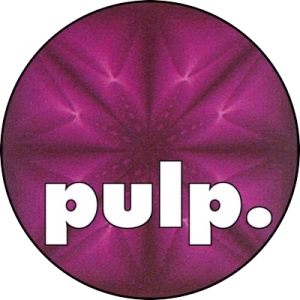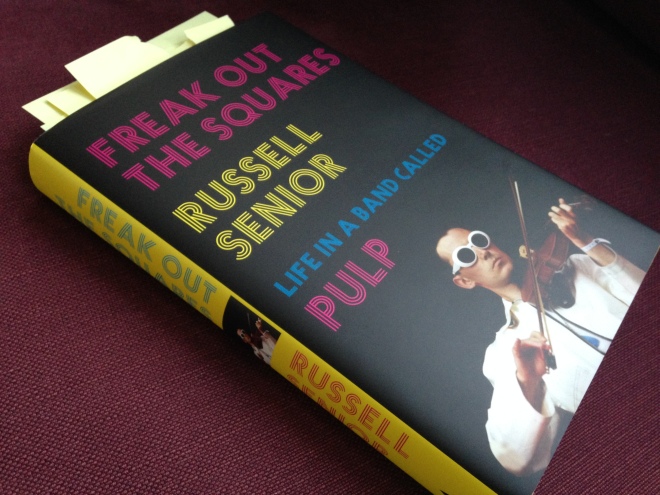At last! A book about Pulp, by a member of Pulp. Not any member of Pulp either, but Russell Senior. He is, by some margin, the band’s most astute, opinionated, authentic and cerebral voice.
It’s all here too: the early days, the bust-ups, the set-backs, the reunion, the Britpop anecdotes, the put-downs and the downright odd occurrences that only someone in a Very Successful Band would encounter.
He’s chosen to weave the story of Pulp’s 2011 reunion throughout the book’s main story which, as you’d expect, focusses on the period from 1984 to 1997. The approach works well and brings to the fore the contrasting fortunes between the young man navigating his way through early adulthood and the middle-aged rock star coming to terms with success.
That Russell was the band’s no-nonsense taskmaster is hard-wired into the Pulp story. Freak Out The Squares reinforces that notion further.
As the band’s oldest and most level-headed member, Russell assumed the role of the ‘responsible adult’. When he wasn’t calling out other band members for titting about, he occupied himself by organising, managing, promoting, scheduling, negotiating, fixing, sorting and motivating.
In the early days he ploughs massive effort into getting bookings outside of Sheffield. He was savvy enough to realise that any band can put on a triumphant show in their home town when half the audience are mates of the band. Getting concerts in Hull, Bath, Chesterfield and Uxbridge – where strangers would turn up to see Pulp – was a different matter entirely and a passport to better things.
When he suspects a well-known Sheffield venue of short-changing the band, Russell’s the one who gets on their case and ultimately takes matters into his own hands. When he’s not kicking against mediocrity, the band’s label, Thatcher or Jarvis’ dubious fashion choices he’s busy cajoling the rest of the band to take their endeavours seriously.
So it’s fitting that when the reunion concerts begin, it’s Russell who sees them as an opportunity to have a summer adventure criss-crossing Europe. His condition for agreeing to play the concerts was that the tour would be taken at a leisurely pace, with festival appearances scheduled a week apart from each other. This was to allow each performance to feel special and to provide plenty of time for sightseeing in between (for which read meandering through Europe’s rural backwaters avoiding anything as bland and as functional as a motorway). When the rest of Pulp agree additional festival appearances, Russell refuses to compromise. That accounts for why Pulp performed some festivals without him. As Russell explains: his fear of flying wasn’t always the sole reason for his absence.
Travelling separately from the rest of the band and crew, he has a ball travelling in a small campervan – affectionately termed the ‘Russ Bus’ – with assorted helpers, family, friends of family and partners in crime. Of all the band members, he’s clearly the one having most of the fun and shows the younger generation he’s travelling with how to misbehave with style.
For the Britpop obsessive there’s plenty of tales that feature the usual suspects: Chris Gentry from Menswear, Luke Haines from the ‘Otters’, all of Blur (usually about their mildly-twattish behaviour), Longpigs, and Suede. There’s a delightful tale about a dispute involving Simon Gilbert’s drum kit. It illustrates brilliantly the petty behaviours and one-upmanship that punctuate the tedium of life on the road.
Surprisingly there are some chunks of the band’s history that Russell has little or no memory of. It’s a trait he shares with Jarvis, although the impression I get from the book is that Russell retains a better grasp than Jarvis does of the key events and their sequencing. Russell admits he has no recollection of either the His ‘n’ Hers UK tour or the 1996 Arena tour despite these each being the biggest tours the band had ever embarked upon at the time. Disappointingly he has nothing to say about the writing and recording of the Separations album – the sound of which he had a significant influence upon. Perhaps there’s a scrapped chapter titled ‘Eastern European Disco Sound’ that didn’t make the final draft.
Reassuringly, those events that are already familiar to a Pulp fan get a more detailed explanation. His chapter about the expedition sailing in a dinghy through Sheffield’s subterranean waterways makes for a superb companion to the lyrics of Wickerman and Jarvis’ short essay on the Rivers Porter and Don. Read it and marvel at the sense of adventure and fear they would’ve felt.
In the book Russell again makes clear that he left the band in circumstances that were far from ideal. That feeling of there being unfinished business – and of wanting to put that right – was felt strongly enough to overcome his other concern that a badly-executed reunion would tarnish Pulp’s legacy. It will come as a relief to his bandmates that he’s resisted the temptation to reopen those old disagreements. Although he doesn’t shy away from expressing his opinions and frustrations, he does so in a way that preserves his own and Pulp’s dignity. He admits that the book is a reflection of events seen through his own eyes, accepting that others won’t always have seen things in the same way:
“There are characters that don’t really exist. Those that do often didn’t do what I say they did. Many of the cleverest things they said are attributed to me. This story is best regarded as historical fiction based upon real events.”
In fact, it’s often more revealing what he doesn’t say. Even once you allow for the fact that Mark Webber didn’t become a full member of Pulp until 1995, Mark barely features in the book compared to the other band members. Infer from that whatever you will.
I thought it was telling that by the time he properly turns his attention to Mark, it’s because of a disagreement they have at the 2011 Dour Festival about the position of Webber’s keyboards on the stage. Tempers flare. It’s a situation that’s uncannily similar to the 1993 episode featuring Simon Gilbert’s drum kit. There’s humour in this book where you least expect it. There are laugh out loud moments too: look out for the tale featuring Mr. Ball and a separate one featuring the Palme D’Or.
In summary then: this book is a triumph.
It’ll be cherished by those of us who’ll take our love and memories of Pulp to the grave. More importantly, it’s a crucial read for those who – pity them – only have a casual interest in Pulp. Fundamentally he writes about themes that are far bigger than Pulp: determination, passion, loyalty, rejection, adventure, success, fame, bloody-mindedness and spending your formative years entwined in a city losing the fight against deindustrialisation.
Which brings us to Sheffield.
Freak Out The Squares confirms what we already know to be true: Pulp were only a going concern in the 1990s because, one by one, the other band members moved down to London. But it was the influence exerted by Sheffield – and Russell specifically – that ensured Pulp made it to the 1990s at all and went on to become the band we recognise today.
For that alone, we owe him great deal.

